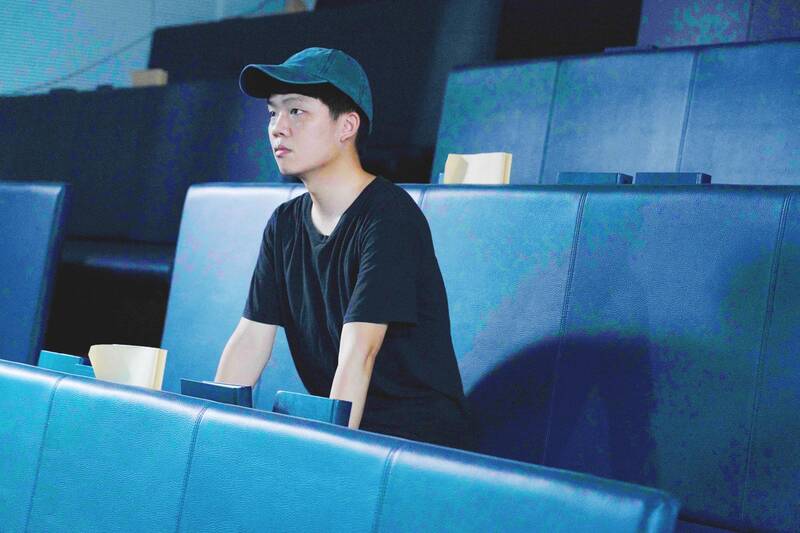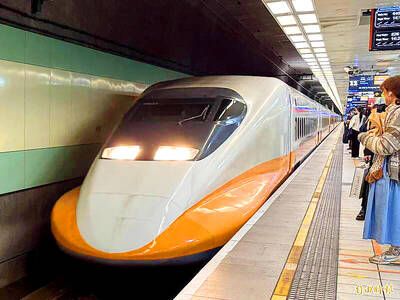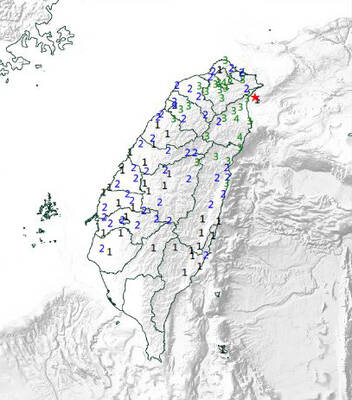Sitting pensively in a pew at a church in Taipei, army reservist Henry Cheng is nonchalant about Chinese warships and jets circling Taiwan — but he also feels ill-prepared for war.
China’s massive military drills early this month pushed tensions in the Taiwan Strait to their highest point in years, deepening fears that Beijing could forcibly take control of the nation.
Coming on the heels of Russia’s invasion of Ukraine, the crisis has revived debate within Taiwan and among key Western allies about the readiness of the nation’s vastly outnumbered military.

Photo: Asnaya Chou, AFP
However, Cheng said he was unconcerned.
“It was like: ‘Oh, they’re at it again,’” the 25-year-old insurance sales agent said. “They’ve been talking about a war since I was little, but there still hasn’t been one.”
Cheng completed his mandatory four-month military service last year, placing him in the ranks of about 2.5 million reservists who could be called up to battle if an invasion took place.
Yet conflict feels like a distant reality for Cheng compared with his usual routine of meeting clients and rehearsing Christian worship songs as a drummer for his church band.
“I’m definitely not ready [for war], because four months to me is more like going there to play,” he said, referring to his training. “I’d probably die very quickly. I’ll face it when it comes.”
Mandatory service used to be deeply unpopular in Taiwan and the government has gradually reduced its length to four months.
However, Beijing’s pressure campaign has grown more intense under Chinese President Xi Jinping (習近平), the country’s most authoritarian leader in a generation, and Russia’s invasion of Ukraine has shown the deadly risks of a giant authoritarian neighbor’s verbal threats becoming real.
As a result, President Tsai Ing-wen’s (蔡英文) administration is exploring whether to reinstate tougher military service.
It is not clear when a decision might be made, but polling shows that more than three-quarters of Taiwanese believe the mandatory service is too short.
Taiwan remains massively outgunned by China, with 88,000 ground forces compared with China’s 1 million, the US Department of Defense estimates.
However the mountainous interior of Taiwan proper would still present a formidable challenge to any invader.
Taipei has stepped up reservist training and increased purchases of jets and anti-ship missiles, but experts say it is not enough.
“I truly believe four months is too short,” said Joseph Hwang (黃基禎), an associate professor at National Defense University. “Taiwan has no condition for voluntary military service whatsoever.”
Peter Yang, an engineer who plays war games in his spare time, remembers much of his compulsory military service was mostly “spent doing paperwork.”
“There was not a lot of time spent on training, just basic physical training and shooting practice,” the 24-year-old said. “Our job is really just to die on the battlefield ... so it’s enough for us to know how to fire a gun.”
He said reservists were given only 12 bullets for each shooting practice.
Last month, former US secretary of defense Mark Esper urged Taiwan to triple its mandatory service to a year and extend its enrolment to women.
US and Taiwanese strategists have pushed Taipei to adopt a “porcupine” strategy of asymmetric warfare like Ukraine to defend against a Chinese invasion.
However, Taiwan’s population appears not ready for the die-hard resistance seen in the streets of Ukrainian cities, said Richard Chou, a retired air force colonel who served for 21 years.
“Taiwan’s military preparation from my perspective is not enough,” the 52-year-old said, adding that he would serve willingly if called back.
“It’s not only about one person holding a rifle. They also have to learn how to handle situations together as a group through training — only then will they have a hope of resisting in the future,” he said.
To demonstrate how unmoved Taiwanese are by the threat, 75-year-old veteran Jasper Lee points around a central Taipei park.
“They just had the military exercise around Taiwan island and the people are like this — dancing, drinking, exercising,” he said.
However, underneath the stoicism, fears of China linger for many.
John Chen, a 26-year-old reservist, said the drills have increased his anxiety, comparing Beijing to a stalker.
“This person really likes you, but he keeps saying you belong to him... He knows where you go to work every day and follows you home from work. This is the situation that Taiwan is in,” he said. “I’m worried about whether my country will continue to exist.”

A 72-year-old man in Kaohsiung was sentenced to 40 days in jail after he was found having sex with a 67-year-old woman under a slide in a public park on Sunday afternoon. At 3pm on Sunday, a mother surnamed Liang (梁) was with her child at a neighborhood park when they found the man, surnamed Tsai (蔡), and woman, surnamed Huang (黃), underneath the slide. Liang took her child away from the scene, took photographs of the two and called the police, who arrived and arrested the couple. During questioning, Tsai told police that he had met Huang that day and offered to

LOOKING NORTH: The base would enhance the military’s awareness of activities in the Bashi Channel, which China Coast Guard ships have been frequenting, an expert said The Philippine Navy on Thursday last week inaugurated a forward operating base in the country’s northern most province of Batanes, which at 185km from Taiwan would be strategically important in a military conflict in the Taiwan Strait. The Philippine Daily Inquirer quoted Northern Luzon Command Commander Lieutenant General Fernyl Buca as saying that the base in Mahatao would bolster the country’s northern defenses and response capabilities. The base is also a response to the “irregular presence this month of armed” of China Coast Guard vessels frequenting the Bashi Channel in the Luzon Strait just south of Taiwan, the paper reported, citing a

BETTER SERVICE QUALITY: From Nov. 10, tickets with reserved seats would only be valid for the date, train and route specified on the ticket, THSRC said Starting on Nov. 10, high-speed rail passengers with reserved seats would be required to exchange their tickets to board an earlier train. Passengers with reserved seats on a specific train are currently allowed to board earlier trains on the same day and sit in non-reserved cars, but as this is happening increasingly often, and affecting quality of travel and ticket sales, Taiwan High-Speed Rail Corp (THSRC) announced that it would be canceling the policy on Nov. 10. It is one of several new measures launched by THSRC chairman Shih Che (史哲) to improve the quality of service, it said. The company also said

A magnitude 6 earthquake last night at 9:11pm struck off northeastern Yilan County, the Central Weather Administration (CWA) said. The earthquake’s epicenter was located in waters between Toucheng Township (頭城) and Turtle Island (Gueishan Island, 龜山島), about 22.1km northeast of Yilan County Hall at a depth of 112km, CWA data showed. There were no immediate reports of damage. The earthquake’s intensity, which gauges the actual effects of a temblor, was highest in Yilan’s Dongshan (冬山) and Nanao (南澳) townships and Taipei’s Xinyi District (信義), where it measured 4 on Taiwan’s seven-tier intensity scale. It measured 3 in other areas of Yilan and Taipei, as